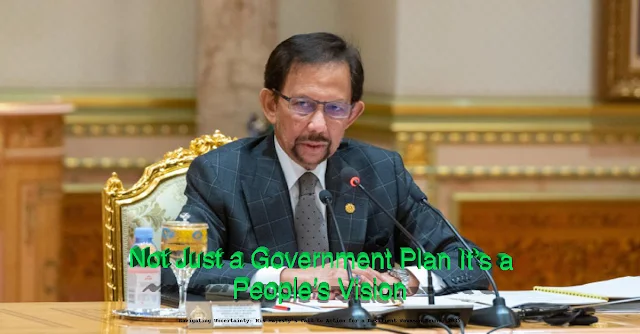"Brunei stands at a pivotal crossroads as Vision 2035 enters its crucial final decade. Can the nation collectively rise to His Majesty's call for dynamic adaptation and unified action to navigate uncertain global economic waters, or will challenges in execution delay the promise of prosperity?"
By Malai Hassan Othman
BANDAR SERI BEGAWAN — In a candid and urgent message, His Majesty Sultan Haji Hassanal Bolkiah Mu'izzaddin Waddaullah delivered a striking reminder that Brunei’s ambitious national development agenda, known as Wawasan Brunei 2035, must swiftly adapt or risk faltering amidst global economic turbulence and increasing international economic tensions.
Speaking at the inaugural session of Majlis Tertinggi Wawasan Brunei 2035 at Istana Nurul Iman, the Sultan stressed the importance of "dynamic, flexible, and constantly evolving" strategies.
He described Brunei’s development blueprint as a "living document" that must respond effectively to emerging global challenges to protect the nation’s economic resilience and social prosperity.
"In a rapidly changing world marked by uncertainty, preparedness to adapt and respond quickly to emerging issues is essential," he cautioned.
His message comes at a critical juncture as Brunei navigates a global landscape characterised by unpredictability and economic friction between major powers.
The Sultan also underscored the importance of comprehensive, whole-of-government and whole-of-nation approaches, especially as the country enters the crucial final decade before the 2035 target year.
"Coordination among agencies and sectors must be strengthened," he declared, "to ensure all parties work together toward common goals."
The meeting reviewed the Wawasan Brunei 2035 Framework, with a focus on maintaining its relevance and responsiveness to current and future socio-economic challenges.
He highlighted the necessity for clearly defined National Key Performance Indicators (KPIs) and the effective use of the Wawasan Brunei 2035 Index.
This integrated approach aims to evaluate policy effectiveness, identify performance gaps, and support informed decision-making and strategic direction.
Analysts noted the significant relevance of the Sultan’s message against the backdrop of Brunei’s struggles to diversify its oil-dependent economy and the slow progress on key performance indicators essential to Wawasan 2035.
Critics contend that despite good intentions, the government's execution has fallen short of its ambitious policy declarations.
"Brunei faces genuine threats, particularly from external economic shocks like the ongoing US-China trade war," said a local economist who spoke anonymously due to sensitivities.
"Our over-reliance on oil revenues and slow economic diversification leaves us particularly vulnerable. The Sultan’s call for urgent, adaptive action is both timely and necessary."
In his speech, the Sultan emphasised that the government alone cannot bear the responsibility of achieving ambitious national goals.
He highlighted the significance of strong public-private partnerships and urged the non-governmental sector to increase its engagement and collaboration.
His Majesty's appeal marks a pivotal shift towards inclusive governance, recognising that real progress necessitates a collective effort.
However, some citizens have pointed out a critical shortcoming in the current approach: insufficient direct involvement and communication with the general public.
Awang Razali, a concerned citizen, stressed the need for "frequent meetings with the people to clearly and explicitly outline their roles in achieving the vision and mission."
He added, "It is not enough for plans and programs to appear impressive on paper; practical implementation is what truly matters. Government initiatives are ultimately for the people, who are the real stakeholders. Without regular engagement and feedback, we risk creating uncertainty and misunderstanding."
Public sentiment reflects cautious optimism alongside underlying frustration, driven by concerns over employment stability, rising living costs, and perceived bureaucratic inertia.
A recent survey indicated that while Bruneians remain hopeful about Vision 2035, many feel that tangible benefits have yet to fully materialise.
"We’ve been hearing about Vision 2035 for years," noted Muhammad, a young entrepreneur from Bandar Seri Begawan.
"But what we really want to see now are real jobs, better incomes, and visible progress. The Sultan’s recognition of the need for adaptability gives me some hope, but seeing actual results is what matters most."
Experts warn that Brunei's reliance on imports, especially commodities and technologies from the U.S. and China, makes the ongoing trade tensions particularly concerning.
With both of these economic giants imposing tariffs and engaging in reciprocal sanctions, the Sultan’s call to continually reassess and adjust Brunei’s development plans is particularly resonant.
"We must acknowledge that our economy is not insulated," said a trade analyst well-versed in ASEAN economic affairs.
"The Sultan's emphasis on flexibility and responsiveness is not only prudent—it’s essential. Brunei must expedite efforts to diversify, especially in sectors such as digital technology, logistics, agriculture, and tourism."
The recent meeting underscored the progress of the blueprints, which serve as essential frameworks for implementing development policies and programs.
Extensive communication efforts are actively being pursued to raise awareness and promote inclusive engagement among all stakeholders, including the general public and the private sector.
Bridging the gap between policy vision and real-world execution remains a significant challenge.
Observers emphasise that, beyond the Sultan’s wise counsel, systemic reforms within government processes and accountability structures are necessary for achieving genuine progress.
"There is still significant bureaucracy," noted a local businessman involved in public-private initiatives.
"His Majesty’s call must now translate into concrete reforms in governance, transparency, and execution. Otherwise, the Vision remains just that—a vision."
As global economic dynamics continue to shift unpredictably, His Majesty’s latest titah serves as a wake-up call for collective responsibility, rapid adaptation, and genuine reform.
Brunei’s Vision 2035 now stands at a pivotal crossroads, where the choices made today will profoundly shape the nation's future resilience and prosperity.
"Brunei must evolve rapidly and collaboratively," concluded the economist. "Otherwise, we risk being left behind." (MHO/05/2025)


.jpeg)
No comments:
Post a Comment